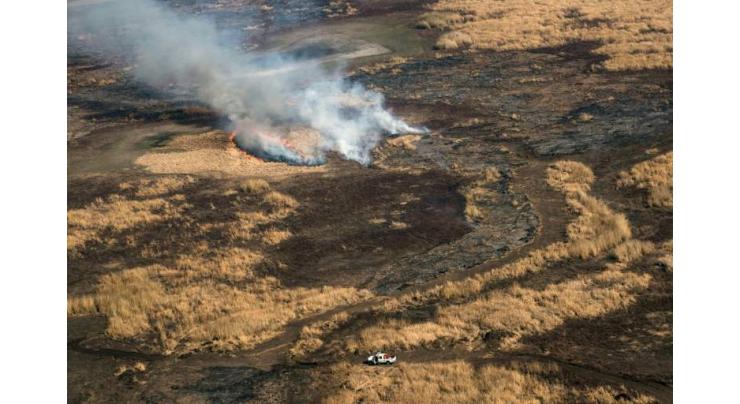
Argentine Marshland Threatened By Worst Fires In Decades
Muhammad Irfan Published August 07, 2020 | 06:08 PM

Ravaged by drought, the Parana Delta in Argentina, one of the largest and most biodiverse in the world, has been burning like never before since the beginning of the year
Rosario, Argentina, (APP - UrduPoint / Pakistan Point News - 7th Aug, 2020 ):Ravaged by drought, the Parana Delta in Argentina, one of the largest and most biodiverse in the world, has been burning like never before since the beginning of the year.
During the first seven months of 2020, more than 11,000 fires were detected in the 14,000 square kilometer (5,400 square mile) region, according to the Antonio Scasso Museum of Natural Sciences.
More than 530 square kilometers of marshland -- an area equivalent to three times Argentina's sprawling capital Buenos Aires, which lies to the southeast -- has been razed, according to estimates based on satellite images.
The flames are devastating the rich biodiversity of a territory that is home to 700 species of plants and animals, according to the National Rosario and Littoral universities.
"The fires generate an immediate impact and others that are felt over the medium and long term: the death of animals, the loss of the natural habitat of many species, impoverishment of the soil, water and air contamination, emissions that generate climate change," Graciela Klekailo, from Rosario University, told AFP.
The delta is a flood plain made up of several islands where the Parana River empties into the Rio de la Plata.
The question on everyone's mind, though, is who is responsible? Environment Minister Juan Cabandie accuses livestock producers of using fire to clear dry pastureland and regenerate it for their livestock.
Cabandie has filed a criminal complaint against producers and land tenants.
But those producers deny the accusations and claim the fires undermine their activities, in turn blaming authorities for "lack of control and neglect." Jorge Postma, from Rosario University, says this year's exceptional conditions have caused the catastrophe.
The Parana River -- whose name means little sea in the local Guarani language -- is much lower than normal.
"Right now the level of the Parana River in the Rosario port hydrometer is 80 centimeters. Normally in this area at this time of year it's three or four meters," said Postma.
Javier Torres belongs to a family in the city of Entre Rios that has produced honey for decades.
This year, 270 bee hives in the Delta's island areas were devoured by fire.
"It took years to build and will take me years to rebuild. I'm heart- broken. I haven't received any help from anyone so far," Torres told AFP.
Depending on the direction of the wind, the largest coastal cities on the western bank of the Parana, such as Rosario, San Lorenzo and Villa Constitucion, are engulfed by a dense cloud of smoke that causes breathing problems and allergies.
It's made all the worse by the coronavirus pandemic.
In June, Rosario University researchers found that the city's air had five times the allowed level of pollution.
"This is very serious in the context of a pandemic, with breathing issues," the researchers wrote.
Related Topics
Recent Stories

Dubai Mum Becomes the First Ever Pakistani Woman to Climb 11 of the 14 Highest M ..

Over 37% Tobacco tax increase suggested to save lives, boost revenue

Mohsin Naqvi has offered a substantial incentive, pledging $100,000 to every pla ..

Citizens join Al Barsha Police in “An Hour for Dubai” Initiative

Art can be a powerful tool to relieve stress, Experts say at Sharjah Children’ ..

Currency Rate In Pakistan - Dollar, Euro, Pound, Riyal Rates On 5 May 2024

Today Gold Rate in Pakistan 05 May 2024

Bugti assures transporters for addressing their problems

Deputy Prime Minister and Foreign Minister, Mohammad Ishaq Dar meets foreign min ..

3 drug peddlers arrested, hashish recovered

1496,990 children given polio drops in five days: DC

Six terrorists killed, hideout busted in N Waziristan IBO: ISPR
More Stories From World
-
Football: Italian Serie A table
4 hours ago -
Tennis: ATP Madrid Open result
4 hours ago -
Football: Italian Serie A results - collated
4 hours ago -
Bodies in Mexico presumed to be missing surfers have bullet wounds to head
4 hours ago -
Rublev battles past Auger-Aliassime to claim Madrid Open title
4 hours ago -
Cesar Luis Menotti, football romantic who led Argentina to first World Cup
4 hours ago
-
Football: German Bundesliga table
5 hours ago -
Former Argentina World Cup winning coach Menotti dead at 85 - federation
5 hours ago -
Leverkusen extend unbeaten run to 48 games with win at Frankfurt
5 hours ago -
Rejuvenated Liverpool dent Tottenham's Champions League dreams
5 hours ago -
Furious Moyes blasts West Ham flops after Chelsea run riot
5 hours ago -
Teenager turns self in after attack on German politician
5 hours ago